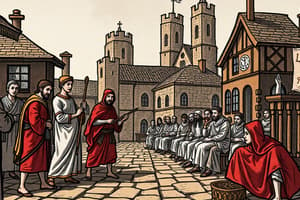Podcast
Questions and Answers
Which period is characterized by the rise of civilizations like Mesopotamia and Ancient Egypt?
Which period is characterized by the rise of civilizations like Mesopotamia and Ancient Egypt?
- Modern History
- Ancient History (correct)
- Medieval History
- Early Modern Period
What marks the beginning of the historical period?
What marks the beginning of the historical period?
- The rise of civilization
- The advent of writing (correct)
- The onset of the Middle Ages
- The invention of the printing press
Which event is considered a significant event in Medieval History?
Which event is considered a significant event in Medieval History?
- The beginning of World War I
- The rise of Islam (correct)
- The signing of the Magna Carta
- The fall of the Roman Empire
What is historiography concerned with?
What is historiography concerned with?
Which of the following is considered a primary source in historical research?
Which of the following is considered a primary source in historical research?
Which theme in history focuses on the structures and impacts of political systems?
Which theme in history focuses on the structures and impacts of political systems?
Who was the founder of the Mongol Empire?
Who was the founder of the Mongol Empire?
What significant event occurred between 1939 and 1945?
What significant event occurred between 1939 and 1945?
Flashcards are hidden until you start studying
Study Notes
Key Concepts in History
-
Definition of History
- The study of past events, particularly in human affairs.
- Involves analysis of documents, artifacts, and oral traditions.
-
Prehistory vs. History
- Prehistory: The period before written records.
- History: Begins with the advent of writing (c. 3000 BCE).
-
Major Time Periods
- Ancient History (c. 3000 BCE - 500 CE)
- Rise of civilizations: Mesopotamia, Ancient Egypt, Indus Valley, China, Greece, Rome.
- Medieval History (500 - 1500 CE)
- Feudal systems, Byzantine Empire, Islam's rise, the Crusades.
- Early Modern Period (1500 - 1800)
- Renaissance, Age of Exploration, Scientific Revolution, Reformation.
- Modern History (1800 - Present)
- Industrial Revolution, World Wars, Cold War, globalization.
- Ancient History (c. 3000 BCE - 500 CE)
-
Historiography
- The study of historical writing and methods.
- Different schools of thought: Marxist, feminist, post-colonial, etc.
-
Sources of Historical Knowledge
- Primary Sources: Original documents, artifacts, eyewitness accounts.
- Secondary Sources: Analyses, interpretations, and summaries of primary sources.
-
Key Themes in History
- Power and governance: Political structures and their impact.
- Economic systems: Trade, agriculture, capitalism, communism.
- Social structures: Class, gender roles, ethnicity.
- Cultural developments: Art, religion, science, and technology.
-
Important Historical Figures
- Julius Caesar: Roman general and statesman.
- Cleopatra: Last active ruler of the Ptolemaic Kingdom of Egypt.
- Genghis Khan: Founder of the Mongol Empire.
- Mahatma Gandhi: Leader in India's struggle for independence through nonviolent resistance.
-
Significant Events
- The fall of the Roman Empire (476 CE).
- The Black Death (1347-1351).
- The signing of the Magna Carta (1215).
- World War I (1914-1918) and World War II (1939-1945).
-
Impact of History
- Shaped modern politics, social systems, and economies.
- Understanding past events helps address present issues and future challenges.
Defining History
- History is the study of past events, particularly those involving humans.
- Historians analyze documents, artifacts, and oral traditions to understand the past.
- Prehistory is the period before written records. History begins with the advent of written records (circa 3000 BCE).
Major Time Periods
- Ancient History (c. 3000 BCE - 500 CE) - The rise of civilizations: Mesopotamia, Ancient Egypt, Indus Valley, China, Greece, and Rome.
- Medieval History (500 - 1500 CE) - Feudal systems, the Byzantine Empire, the rise of Islam, and the Crusades.
- Early Modern Period (1500 - 1800) - The Renaissance, the Age of Exploration, the Scientific Revolution, and the Reformation.
- Modern History (1800 - Present) - The Industrial Revolution, World Wars, the Cold War, and globalization.
Historiography
- Historiography is the study of historical writing and methods.
- Different schools of thought in historiography include Marxist, feminist, and post-colonial perspectives.
Sources of Historical Knowledge
- Primary Sources: Original documents, artifacts, and eyewitness accounts.
- Secondary Sources: Analyses, interpretations, and summaries of primary sources.
Key Themes in History
- Power and Governance: Political structures and their impact on society.
- Economic Systems: Trade, agriculture, capitalism, and communism.
- Social Structures: Class, gender roles, and ethnicity.
- Cultural Developments: Art, religion, science, and technology.
Important Historical Figures
- Julius Caesar: Roman general and statesman, played a key role in the Roman Republic's transformation into the Roman Empire.
- Cleopatra: Last active ruler of the Ptolemaic Kingdom of Egypt, known for her political savvy and relationship with Roman general Mark Antony.
- Genghis Khan: Founder of the Mongol Empire, united nomadic tribes and conquered vast territories, creating a vast empire.
- Mahatma Gandhi: Leader in India's struggle for independence from British rule, advocating for nonviolent resistance.
Significant Events
- The Fall of the Roman Empire (476 CE): Marked the end of Roman political unity and the beginning of the Middle Ages in Europe.
- The Black Death (1347-1351): A devastating pandemic that killed millions across Europe, resulting in significant social and economic changes.
- The Signing of the Magna Carta (1215): A document that limited the King's power and established the principle of due process of law in England.
- World War I (1914-1918) and World War II (1939-1945): Global conflicts that resulted in significant loss of life and reshaped the world order.
Impact of History
- History shapes modern politics, social systems, and economies.
- Understanding past events can help address current issues and future challenges.
Studying That Suits You
Use AI to generate personalized quizzes and flashcards to suit your learning preferences.




